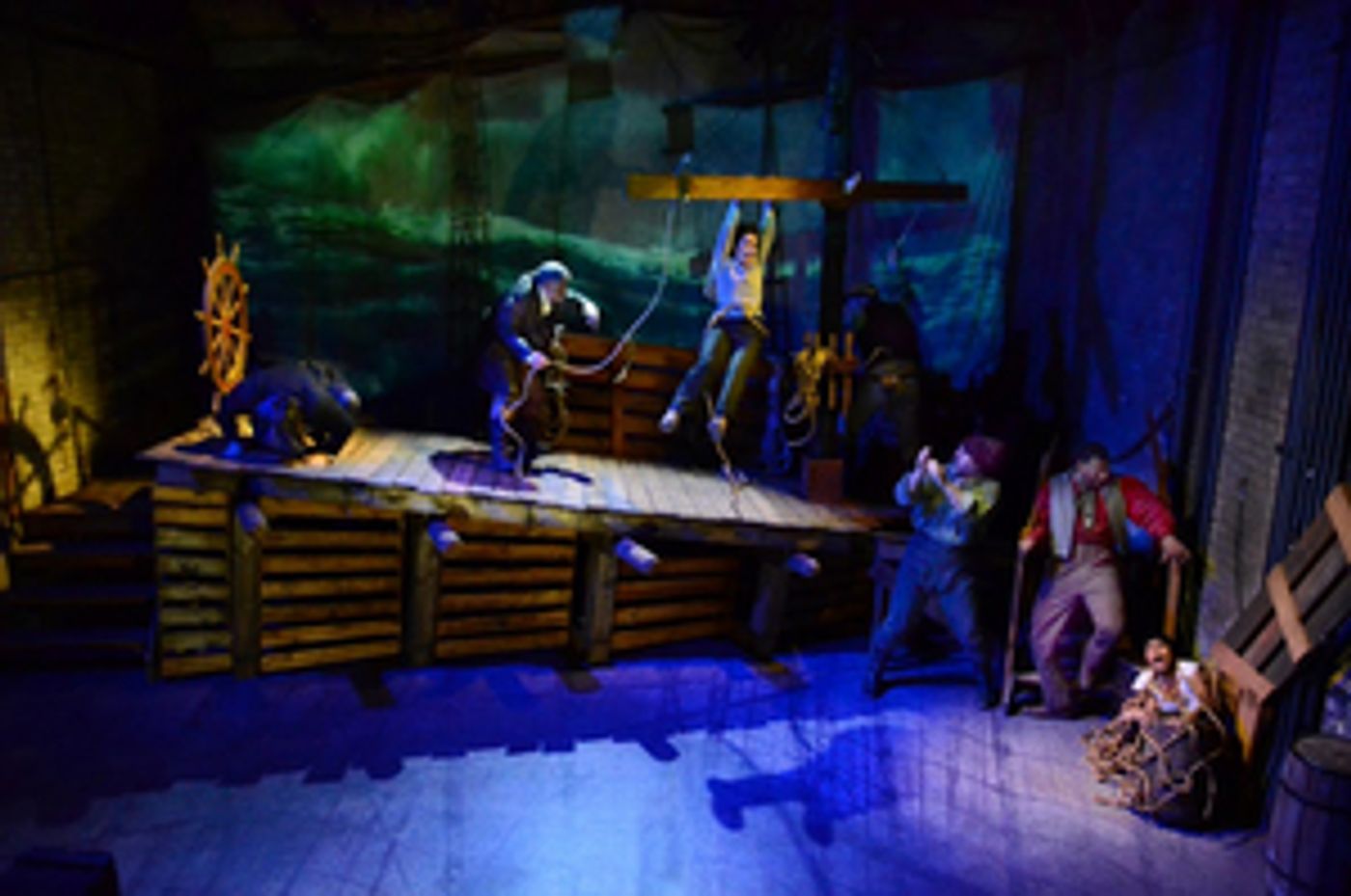Review: MIDDLE PASSAGE at Lifeline Theatre

In Lifeline Theatre's MIDDLE PASSAGE, the intimate Rogers Park venue transforms into the scene of a 19th century maritime epic. Artistic Director Ilesa Duncan and David Barr III adapt Charles Johnson's award-winning 1990 novel for the stage, and Duncan directs. The sprawling tale follows a recently freed slave as he journeys from the gambling dens of New Orleans to the heart of the African slave trade and back again.
Michael Morrow stars as Rutherford Calhoun, a likable young rogue. Gaining his freedom upon his master's death, he moves to New Orleans in 1830. With barely any money to begin with, Rutherford supports himself through petty theft and soon runs up gambling debts. After a flirtatious friendship with Isadora (Shelby Lynn Bias), a prim and proper teacher from Boston, Rutherford finds himself facing a forced marriage at the hands of his ruthless creditors. He escapes by stowing away on a vessel that turns out to be a slave ship, en route to pick up a "cargo" of captives from the Allmuseri tribe, a mysterious, fictional people from West Africa.
Rutherford encounters a vibrant cast of characters on his travels. These include cruel Captain Ebenezer Falcon (Patrick Blashill), kindly first mate Peter Cringle (Andrés Enriquez), the Allmuseri captives, and an ominous creature caged in the ship's hold. With a crew mutiny and a slave revolt brewing, both sides try to enlist Rutherford's aid. Meanwhile, Captain Falcon wants his services as a spy. This tense situation forms a dramatic backdrop for Rutherford's coming-of-age story on the high seas.
With slavery as a central theme, the production doesn't shy away from portraying its physical violence and psychological torment. The Allmuseri enter in chains, are inspected like animals on the auction block, and forced into infamously cramped quarters aboard ship. Beyond these obvious cruelties, we also witness the cultural suppression inflicted by the slave traders. Having grown up a slave, Rutherford envies the Allmuseri's rich culture and history. In comparison, he feels that he has no past at all. And yet, even before they reach America, he observes a sad change in the Africans. In the hands of their captors, "they weren't fully Allmuseri anymore."
Composer and music director Shawn Wallace, working with Duncan as lyricist, plays an important role in developing the different cultures in this story. In the early New Orleans scenes, we hear the influences of African American spirituals and Creole folk music as the cast sing mostly a cappella, beating out their rhythms on improvised percussion instruments. On board ship, the ship's crew carry off hearty sea shanties with gusto, showing their roots in the British Isles. In one memorable scene, the sailors' jaunty tunes are juxtaposed with the haunting chants of the Allmuseri. Later, music becomes yet another tool of oppression when the Allmuseri are forced to dance a jig, "for exercise," to the tune of a penny whistle.
As usual, set designer and Lifeline ensemble member Alan Donahue finds creative ways to make the most of the theater's small stage. With the help of Paul Deziel and Alex J. Gendal's projections, a single slanted platform with a mast becomes a ship. When a storm hits, Simean "Sim" Carpenter and Scott Tobin's lighting and Barry Bennett's sound design complement Nicole Clark-Springer's choreography as the actors lurch across the deck.
Undoubtedly, MIDDLE PASSAGE is an ambitious novel to put on stage. With such an eventful narrative, several characters' backstories feel underdeveloped or rushed in this adaptation. Still, Rutherford's journey from boy to man is an impressive feat of storytelling, in large part because of its creative use of traditional adventure tropes to examine weighty issues of racism and slavery.
MIDDLE PASSAGE plays through April 5 at Lifeline Theatre, 6912 N. Glenwood Ave., Chicago, IL 60626. Tickets are $20 - $45 and are available at 773-761-4477 or www.lifelinetheatre.com.
Photo credit: Suzanne Plunkett
Review by Emily McClanathan
Reader Reviews

Videos

